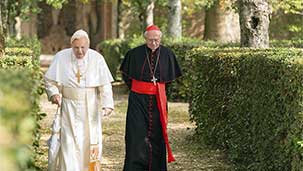The Old Testament tells a tale in which humans lived together, speaking and understanding one united language until they decided to build a tower tall enough to reach the heavens. As the story goes, God, perceiving this endeavor as a challenge to His omnipotence, confounds language so that humans can no longer understand one another, and He scatters them far across the earth.
The Catholic Church found a way to communicate with God and His followers in the form of the Papacy, whose head, The Supreme Pontiff, is perceived to be a representative of God on earth. This hierarchy – from God’s mouth to the Pope’s ears, then down to the cardinals, bishops, priests and so forth until His message is received by the people – was established in order to preserve the faith. And when the Pope dies, these men come together to choose who will be next to deliver The Divine Word. Someone to shape what they hear from God into doctrine.
A dialect coach for the Catholic Church, if you will.
Today, that selection goes something like this: Hundreds of Cardinals from around the globe assemble at The Vatican. Outside, journalists beam their reports to satellites which deliver their words to the internet’s global village. Inside, the College of Cardinals begin the secret conclave, a process mostly unchanged for a thousand years. Here they will eat, sleep, and pray in seclusion with absolutely no contact with the outside world while they vote to choose a successor. Across the globe, believers await the announcement of a new Pope via a universally understood signal – a white puff of smoke from a chimney.
Thus begins the story of The Two Popes, the latest from acclaimed Brazilian director Fernando Meirelles, about the relationship between Pope Benedict XVI and his reluctant successor, Pope Francis. Under their maker’s gaze from the ceiling of the Sistine Chapel, these two very different men, from different countries, backgrounds, and viewpoints, engage in a complex pas de deux which will challenge their faith and change their lives.
At its heart, The Two Popes is a story of communication. Francis, a former nightclub doorman and Argentinian Jesuit, is a reformer, who ultimately believes he can do more for the church as a simple parish priest. He makes his way to Rome to offer his resignation as a Cardinal. Benedict, a conservative defender of traditional Catholic doctrine, born and raised in Weimar Germany, stubbornly rejects this resignation.
Anthony Hopkins’ Benedict and Johnathan Pryce’s Francis verbally spar in Latin, Spanish, Italian, German, and English, urging one another towards reason, often settling for détente. Their dialogue is respectful but pointed, sweet and salty, and delivered by two veteran performers who play off one another expertly. Thanks to you and the other dialect advisors, the transitions between languages is fluid. It is a marvel to watch them trade treacly barbs in varied tongues while forming a tentative friendship. Their goal – to unite the Church and its followers – is the same, but their methods and mentalities are not.
Meirelles takes what could have been a dry, exhaustive tale of Papal politics, and instead gives us a spirited and contemplative take on recent history disguised as a platonic romance, complete with a meet-cute set to ABBA’s Dancing Queen. By weaving actual footage with behind-the-scenes Vatican protocols, two-handers set in lush gardens, loud helicopters, and prim sitting rooms, and jumping from past to present, Meirelles sets a delightful pace which always keeps this friendship front and center.
He pays particular attention to crafting Francis’ arc, bouncing back and forth between his current life as a beloved street preacher in Buenos Aires, to his past as a heartbroken young man who enters the Seminary, and his regretful actions during Argentina’s “Dirty War” of 1976, the shame of which prevents him from seeking advancement. Hopkins’ Benedict is far more suited to the Papacy, an elusive Pontiff who revels in the pomp and ceremony of his office but accepts that he must sacrifice his pride and position if the Church is to survive the growing spread of corruption and secularism.
The Two Popes is a gentle and mature meditation on the merits of finding common ground. Whether these two men did indeed bond over music, football, and Fanta is irrelevant when the fictional fly-on-the-wall retelling of their relationship is imagined with such tenderness. Their verbal tango between progress and tradition, faith and fallacy, ultimately leads to a deepened acceptance of their own pasts, and the future they want for the world. Hopefully, it’s a message we can all understand.
Ad summum,
Di







